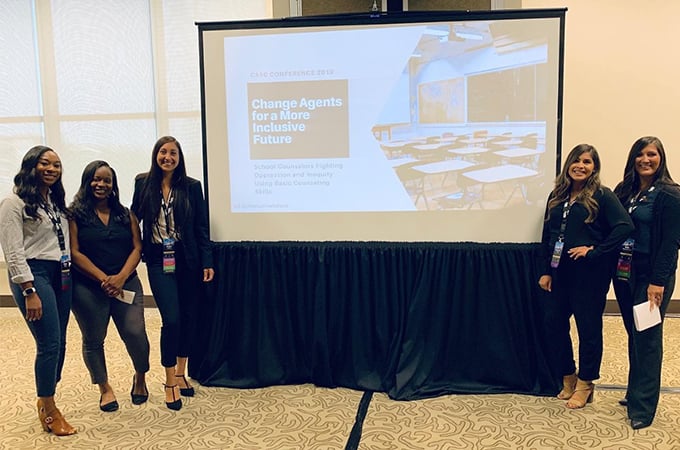School of Education Professor Tamara Tribitt and a group of her graduate students recently spoke at the 2019 California Association of School Counselors (CASC) conference in Riverside, California on how school counselors can advocate for the students they are serving.
The California Association of School Counselors is a professional organization that provides leadership and advocacy for counselors in the state. Along with a variety of certification and training events, the association hosts a statewide conference each year. This year, more than 70 topics were discussed, including effective technology integration, social and emotional learning, and students’ transition from high school to college.
Opening doors
Tribitt knew she wanted to deliver a presentation at the event and create an opportunity for University of Redlands counseling students at the same time. After sending an email to first-year school counseling students, five of them—Amber Arguello ’20, Sally Chavez-Oyervides ’20, Creeon Kelly ’20, Breena Lizaola ’20, and Naoje Williams ’20—agreed to participate. None had presented at a conference before.
“The School of Education’s school counseling program encourages faculty to open doors for students to become leaders in the profession,” says Tribitt. “By having access to present at these kinds of events, students can meet professionals and leaders in the field, which will benefit them in their future careers.”
Once the general idea for the presentation was established, Tribitt occupied a supporting role and let the students take the reins. The group spent months researching case studies that would fit into their presentation.
In California, school counselors are often burdened with large caseloads because of understaffing. While school counselors don’t do clinical mental health work, they are still largely responsible for maintaining students’ wellbeing.
“Not everyone knows what school counselors are capable of,” says Tribitt. “In an ideal world, school counselors foster students’ social, emotional, and academic success and promote career and professional development.”
Change agents
The U of R group’s presentation, titled “Change Agents for a More Inclusive Future: School Counselors Fighting Oppression and Inequity using Basic Counseling Skills,” addressed the fact that, in many school environments, students don’t receive individualized support based on their unique needs.
“This basically means that students often don’t have the resources to be successful in their area of interest,” says Breena Lizaola ’20. “This can be because they don’t have the right books or access to computers, which contribute to college readiness and future success.”
The presenters posited that school counselors can help combat this inequity with skills such as effective communication, active listening, responsive and reflective teaching, and building relationships with parents and teachers. The need for advocacy varies with each student—some benefit when counselors talk with their parents, but when it comes to policy change, counselors may need to engage with school district administrators and boards.
“As school counselors, we are equipped with skills that allow us to create relationships and build rapport with our students,” says Lizaola. “Most of the time, we are the ones receiving information from students that they are not sharing with parents or teachers. By being transparent and trusting, students share important information that allows us to better advocate for them.”
Looking ahead
According to Lizaola, the most rewarding aspect of the experience was presenting to an audience of over 60 current school counselors. At the end of the session, members of the audience talked about some of their experiences in the field, which was something the students found valuable.
Tribitt says that the presentation was a success and she plans to make another call for participants this year. Due to feedback from the presenting students, Tribitt has implemented an assignment that requires students to write a presentation proposal and deliver the presentation in class.
“That way, students will have something ready in case they want to submit it to various conferences, such as CASC,” she says. “I hope that more students will take the opportunity to present while I continue to support them during the planning phase and cheer them on through their presentations.”
Learn more about the School of Education and its Master of Arts in School and College Counseling.






